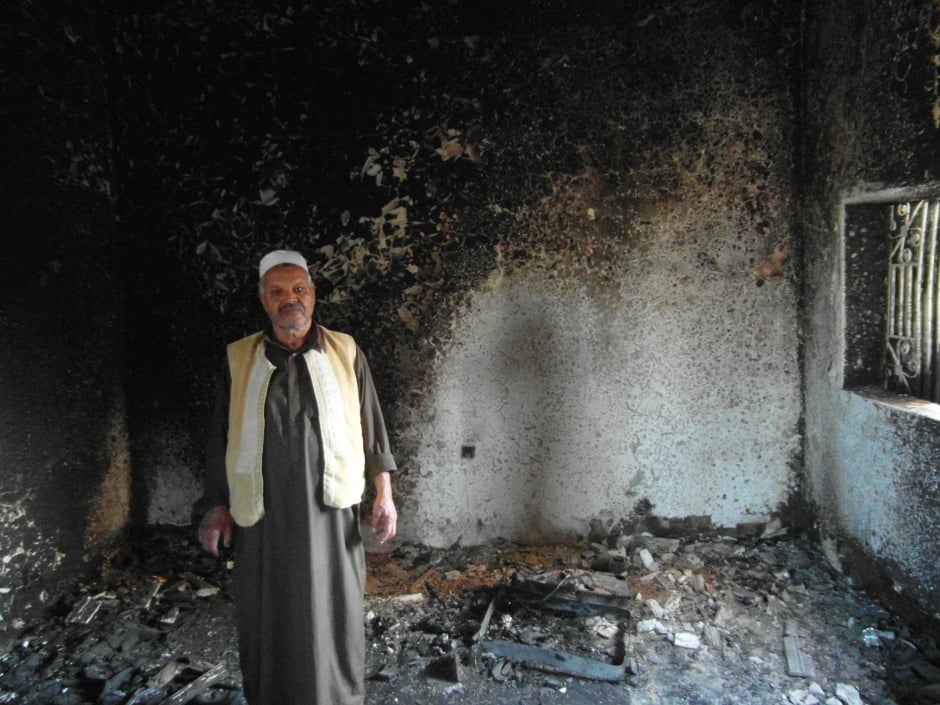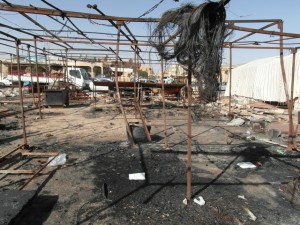By Mathieu Galtier.

Bani Walid, 7 November:
The government says that Bani Walid will be back to a normal in a week or . . .[restrict]so, with the local authorities taking charge. However, locals are fatalistic; they know it will take months to erase the scars of the siege and the attack of their city.
General Hussein Abdullah, the chief of the temporary military council in Bani Walid, is proud to list all the achievements since the army’s successful attack on Bani Walid.
“The security is good, eighty percent of electricity and water supplies are back, schools will re-open in three or four days, the hospital has been replenished with drugs and equipment and the roads are largely open.”
According to Bani Walid hospital, the attack [http://www.libyaherald.com/2012/10/27/bani-walid-operation-a-necessary-evil/], which happened just before Eid, killed 30 people, most of them civilian Warfallah, with 50 injured .
After the military operation, on 24 October, the government created three committees for Defence, Public Services and the Return of Refugees. These committees report to General Abdullah.
“I hope to leave Bani Walid in less than one week” he told Libya Herald. “The local police will take over when we leave.”
Abderhaman El Ahmari had just returned to Bani Walid to fulfil his own mission : to rebuild his family’s new life and home. On 25 October, he discovered that his two-storey house was burnt.
“I used to live in this house with my wife and my five children. They stole my gold worth LD 180.000, which I kept in a strongbox. I don’t know who has done this, but they as Muslims, they showed a lack of respect. I still believe the situation will improve in the country but not now, maybe after this government”, he told Libya Herald sadly. At the moment, he and his family are living with relatives in Bani Walid.
The smell of burning, the black smoke-stained walls and the sound of glass cracking underfoot are the same in Al-Adj’s family house. Back from Taruna, on 27 October, the nine members of the family saw their home was totally destroyed.
“My mother cried when she saw it burnt. Now, all of us are living in the same room, which is independent from the house” Hussain, one of the sons, explained. In the corridor, one message is written on the dust of a mirror : “Allahu Akbar” (God is great).
As far as Libya Herald could check, many of the destroyed homes were in the Darah area of the town. But in a community as tight as the 80,000 Warfallah in Bani Walid, it seems almost everyone knows someone who has been hit with disaster. Libya Herald noted dozens of shops had been looted and many others are still closed. The normal daily life is coming back slowly [http://www.libyaherald.com/2012/10/10/inside-bani-walid/].
Nevertheless, Bani Walid is not like the largely-deserted town of Tawagha.
“I am surprised in a good way. “ said a Tripoli resident who had returned to visit his family, “I had heard on TV that the situation was very difficult in Bani Walid and it is not so bad.”
Indeed, Ahmed El Jedil, the director of the hospital, is very confident. “In a few days, the hospital will be better than before. We have collected drugs and ninety percent of the medical equipment we need. We are just waiting for the competent people to come to use the equipment.”
But among the population, the situation is far from perfect. Even if there is no more fighting in the city, people are still afraid.
“Nobody is on the street after the sunset, like a curfew.” a man wearing in a white djellabia, said in the main square. “We are afraid of the militias. They are from Misrata, Zawya and Tripoli, not from Bani Walid. They come inside houses to destroy everything.” While speaking, he shaped his fingers as a gun and put them to his throat.
A long queue is waiting outside a bakery, the only one still open. The words are different but the fear is the same.
“There are no national police downtown, only militias. When I see one of them in the street, I change the direction. We know they arrest young people just like that, with no reason”, complained a young man called Abu Salam. Few metres from him a graffito written during the attack seems to give back Abu Salam’s alarm. It reads in English: “F*** off Bani Walid”.
Most of the 25,000 Bani Walid inhabitants who, according to the International Red Cross, fled before the final attack, have now returned from Taruna or Tripoli.

A major loss has been the destruction of the main market. On Tuesday, only one stall was open in which we could find a few vegetables; onions, lettuce, cucumbers, eggplants and cauliflowers.
“The so-called police asked us to move from here with no explanation”, the trader complained. A few others merchants are selling their goods directly from the backs of their pick-ups, so they are in a position to move off more easily.
People make it plain that they are looking forward to the departure of the current security details, whom they don’t trust at all.
However, one militia officer from Tripoli, who would say only that his name was Mohammed, painted a very different picture : “The security is very good in Bani Walid. You know the people like to make exaggerations”.
Asked about the looted and destroyed houses, Mohammed replies that the families can file a claim: “An official will come to check their situation and then the government will pay them back.”
A local called Mustafa, standing close by, doesn’t believe it. When the militia officer had gone he said: “I was in the police station about my uncle’s house, which was destroyed. The policeman was writing a false statement in a bad Arabic. I don’t believe the government will help us.”
[/restrict]









